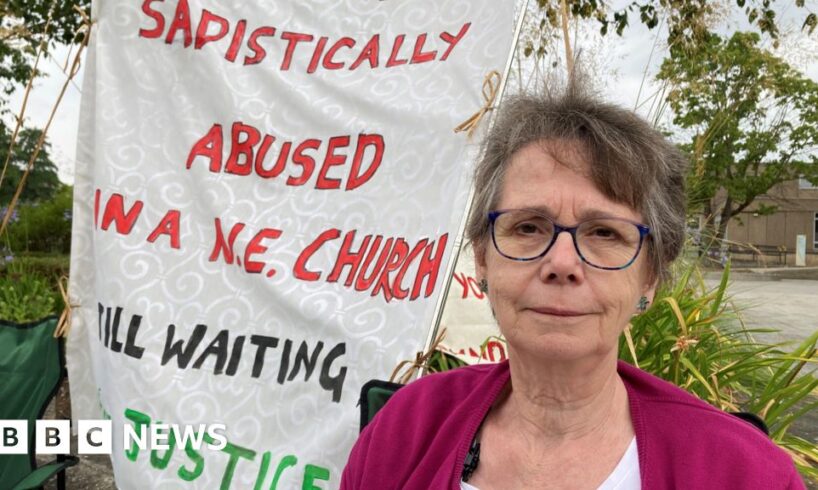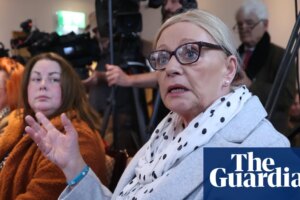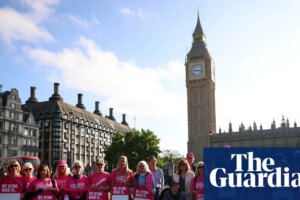
Martin Lindsay
BBC North East Investigations
BBC
Jenny Read reported allegations of abuse to the Church of England but it did not formally investigate.
Jenny Read says she was abused as a little girl at a church in the north-east of England. Last week she protested outside a meeting of the Church of England’s parliament as it signed off on a compensation scheme for abuse victims, which she says is too little, too late.
It is 07:30 BST on a grey, humid July morning in York.
The city is hosting General Synod – the Church of England’s parliament – which is about to approve the landmark compensation legislation.
Ms Read, who travelled from her north-east of England home because she “had to be here”, has already set up outside.
She says, as a child, she was “sadistically” abused over a number of years at her local church by her own father, and also by a male curate and a female church warden.
In adulthood, she and her sisters, who also say they were abused as children by the same people, reported the allegations to the Church of England three times, but it never launched a formal investigation.
Ms Read is at General Synod to protest.
But she is not blocking traffic, nor is she chanting or shouting into a megaphone. She is sitting peacefully in a camping chair opposite Central Hall, where the event is being held, drinking a cup of tea and eating a biscuit.
She is quiet, but she no longer feels silenced and her presence is powerful.
Behind her stands a banner she has made. In big red, black and green letters it reads: “Three sisters sadistically abused at a NE church still waiting for justice.”
Jenny Read
Jenny, Wendy and Christina Read told the BBC they were abused as children at a church in the north-east of England.
Ms Read’s appearance in the shadow of the chamber housing the most powerful figures in the Church of England is striking.
Throughout the day members of the public, bishops, clergymen and clergywomen approach her to ask what her story is. Some take over food and drinks.
Ms Read says she is here to tell Church leaders that there is an “urgent need” to treat people who report abuse allegations with kindness because “that hasn’t been our experience”.
Her fight for answers has been re-traumatising, she says, but she has waived her right to anonymity in order to share her story.
Time may have passed but the mental anguish caused by the abuse and the alleged “fobbing off” from Church leaders has not, she says.
In a face-to-face meeting with her in May, Archbishop of York Stephen Cottrell, the interim leader of the Church, offered an “unequivocal apology” for the abuse she had experienced and “recognised that it will have affected her life in many ways”.
Last month, following a BBC investigation which revealed the Read sisters’ story, the Church of England also said it was “truly sorry” for the response they received when they made their initial reports.
‘Survivor focused’ compensation
The Church has put aside £150m for what it is calling the Redress Scheme, to which any victim of Church-related abuse can apply. It was agreed by General Synod, but still needs to be officially signed off by the government.
The Church says the scheme is “survivor focused” and “offers more than money”.
As well as financial compensation, which can range from £5,000 to £660,000, survivors and victims can also receive “a formal apology, acknowledgment, therapeutic support, and other forms of bespoke redress”, it says.
Applications can be made via a designated website and “independently assessed by trained assessors” who will consider the type of abuse, aggravating factors and the impact on the victim, it says.
They will then decide the level of compensation and support given.
“This is about the Church facing its past failures with honesty and humility,” it says.
Diocese of Winchester
The Right Reverend Philip Mounstephen said the scheme would offer bespoke support
The Right Reverend Philip Mounstephen, who chairs the Church’s Redress Board, says it is “a matter of great shame” that the scheme is needed.
He has previously said it was unclear how many people would apply.
“I am confident the scheme will provide much needed redress to survivors,” he says, adding it will be “bespoke” for each applicant.
The scheme has already been delayed by several years and, for Ms Read, it is too late.
She has already “spent so many hours and months” in therapy and does not want to “spend any more of my remaining years trekking to therapists”, she says.
“Even if I got the highest award possible, that doesn’t compensate for my trauma.”
Ms Read has been diagnosed with depression and post-traumatic stress disorder linked to her childhood abuse which has, at times, plagued her adult life.
Her relationships have been affected and she has only ever been able to work part time.
She has panic attacks in religious buildings which make her feel “terrorised” to the point she “has to scream” and get out. Episodes of feeling suicidal mean she “has struggled to survive” on occasions.
“Redress sounds good but, from past experience, I can’t quite believe it,” Ms Read says.
“It’s really urgent to highlight the need for the Church to get safeguarding right, not just on paper but in actions.”
Her silent protest brought some closure and, after decades of her feeling dismissed, people have eventually listened, she says.
“I feel like my voice has finally been heard. I can now move on with the rest of my life.”





